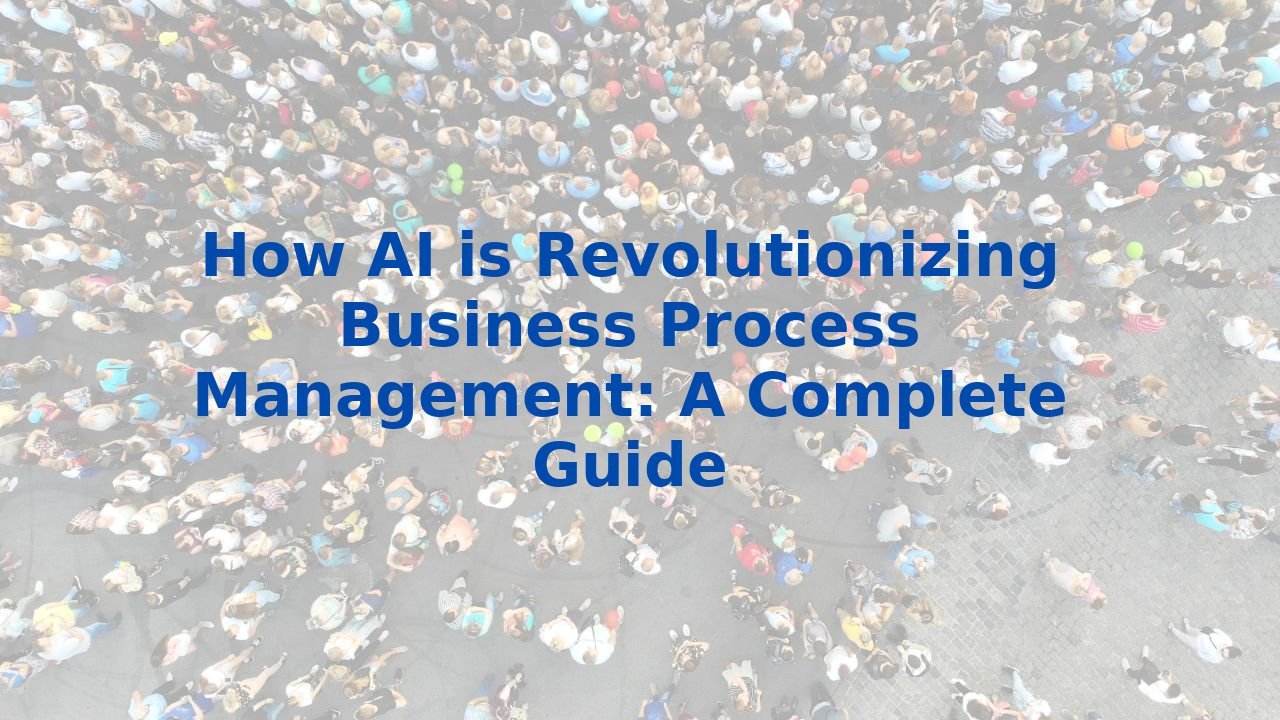How AI is Revolutionizing Business Process Management: A Complete Guide
How AI is Revolutionizing Business Process Management: A Complete Guide
The Transformative Role of AI in Business Process Management
In a world where efficiency and productivity are paramount, the integration of Artificial Intelligence (AI) into Business Process Management (BPM) represents a significant leap forward. It’s not just about keeping up with the competition anymore—companies today must leverage the power of AI to streamline operations and unlock new levels of performance.
Understanding AI in Business Process Management
When we talk about AI in BPM, we refer to implementing AI capabilities to enhance, analyze, automate, and optimize business processes. Imagine having a tool that can sift through mountains of data, automate repetitive tasks, and offer insights that drive effective decision-making. This is precisely what AI brings to the table, revolutionizing how companies operate.
Key Components of AI in BPM
To grasp how AI improves BPM, it's essential to understand its key components:
- Data Analysis: AI can analyze vast datasets to help leaders identify trends and make informed decisions. This capability empowers businesses to predict outcomes and streamline processes based on data-driven insights.
- Process Building: AI aids in the creation of efficient workflows tailored to specific business needs, using historical data to drive the design of new processes.
- Automation: With AI, organizations can automate rule-based, manual tasks, allowing human employees to concentrate on high-impact, strategic initiatives.
The Benefits of AI in BPM
Harnessing AI in BPM is not just about technology; it’s about the tangible benefits that propel organizations forward:
- Improved Efficiency: AI can rapidly analyze data, revealing critical insights and prompting quicker decision-making. By identifying anomalies and deviations early, it empowers businesses to mitigate risks effectively.
- Enhanced Decision Making: Organizations gain access to rich data-driven insights that facilitate sustainable process improvements, thanks to AI’s predictive modeling and robust analytics capabilities.
- Process Optimization: AI-driven historical analysis allows businesses to pinpoint bottlenecks and estimate the impacts of potential changes, optimizing performance and reducing costs.
- Real-Time Monitoring: AI provides up-to-the-minute status reports of business processes, enabling quick adjustments to capitalize on opportunities or resolve issues as they arise.
AI Applications Across Various Business Processes
The application of AI transcends specific departments; it revolutionizes processes across the board:
- HR Processes: AI enhances recruitment and onboarding, ensuring objective decision-making while personalizing employee experiences.
- Sales Processes: By automating lead scoring and suggesting upsell opportunities, AI empowers sales teams to prioritize effectively and close deals faster.
- Customer Service: AI-driven chatbots manage basic inquiries and analyze service quality, ensuring a seamless customer experience while providing invaluable feedback for improvement.
- Product Development: Generative design software powered by AI allows teams to explore countless design variations, saving time and money while improving product quality.
The Importance of Training Employees for AI
While technology plays a vital role, enabling employees to work effectively with AI is equally critical. Investing in training fosters a culture of agility and innovation.
- Understanding AI Capabilities: Employees educated about AI’s potential can harness its power meaningfully within their workflows.
- Developing New Skills: Focusing on skills such as data analysis, strategic thinking, and problem-solving equips teams to thrive in an AI-enhanced work environment.
- Adapting to Automation: As routine tasks become automated, employees can shift focus to strategic initiatives, unlocking greater value across the organization.
For organizations aiming to equip their workforce, comprehensive training programs can yield immense benefits. Complete AI Training offers a range of resources to prepare your teams, ensuring they can leverage AI tools to their fullest potential.
Conclusion
The integration of AI into BPM is no longer a luxury; it has become a necessity for organizations aspiring toward operational excellence. By embracing AI's capabilities in data analysis, process optimization, and automation, businesses unlock new efficiencies and enhance decision-making processes. However, this transformation requires more than just technology; it demands an investment in human capital through training and development. The future belongs to those who harness AI intelligently while empowering their workforce to adapt and thrive. Together, they will shape sustainable improvements within business processes, driving success in an ever-evolving marketplace.



